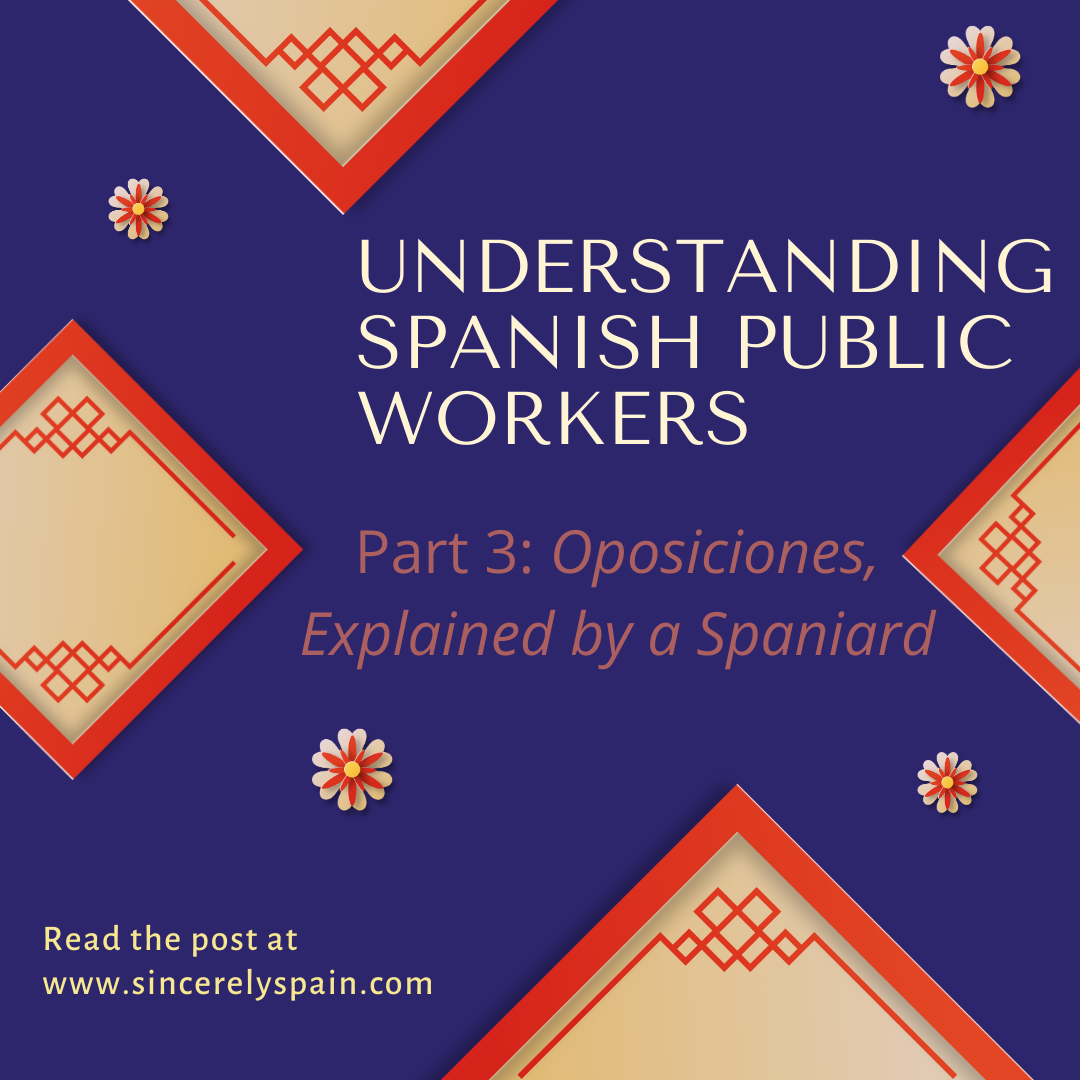
Oposiciones, Explained By a Spaniard
Dear Lara,
Working as a civil servant, or funcionario as they’re called in Spain, is a very common goal of many Spanish people due to the job market situation and other factors. We have previously posted two articles to help you understand this tendency: Understanding Spanish Public Workers: Funcionarios and Understanding Spanish Public Workers: Oposiciones. However, this can be a complex topic to grasp for someone coming from a different country and cultural understanding of being a public worker. For this reason, we have asked guest writer Pablo Domingo Montesinos to explain the entrance exam process (oposiciones) in more depth and share his personal opinion as a Spanish person.
Pablo was born in Jaén and studied architecture in Granada. After several years working as an architect in Spain, The Netherlands, and Switzerland, he got to know online businesses. You can see some of his work on his blog 10endibujo.com or on one of his websites robotaspiradorya.com. Apart from that, Pablo has a wide range of interests in different hobbies such as learning languages, travelling, contemporary dance, and yoga. He has been travelling around Europe and America for the last eight months, where he has taken the opportunity to learn some basic French and Russian and deepen into Bikram Yoga. You may follow him on Instagram.
Without further ado, we bring you Pablo:
 When you finish your studies at the university in Spain you mainly have the following options:
When you finish your studies at the university in Spain you mainly have the following options:
• Continue studying
• Find a job as an employee
• Study oposiciones
(There are other options like running your own business, working abroad for some months or similar ones but the vast majority of Spanish people choose for these three.)
Actually lots of them (like really a lot) decide for the last option.
It is a controversial issue and actually it is not easy to express your opinion in Spain without having an argument with someone, especially if you are against oposiciones. I myself did not do any oposiciones and have no interest in doing any (at least for now), but two of my siblings and some friends did. My opinion is of course personal, subjective and based on my own perspective and experience, so do not take it as the truth.
Since the oposiciones might be something completely new for most readers of this blog and probably it is not easy for foreigners to understand what it is all about, let’s start from the beginning.
1. What are oposiciones?
The oposición is a test (or audition) where the goal is to get a public job, either for the Estate, the regional Government, or the City Hall.
The main incentive for most people is that this work placement lasts for your whole life, so you know you will have a steady salary and job security until your retire.
You can find all type of oposiciones in Spain. You can do oposiciones to become a teacher at a public school (either primary or secondary), to have employment as a judge, to enter the police force, to work in a city hall, to have a job as a nurse, etc. For each of them you need a certain level of studies, a certain bachelor or masters degree and you are not allowed take part if you do not have them.
 The oposición usually consists of three parts:
The oposición usually consists of three parts:
1. Theory: It is an exam where you have to develop a chapter related to the general topic of the oposición. You can find oposiciones where there are 30 chapters and others with more than 200.
2. Practical part: In most oposiciones you need to do an exam where you have to solve one or more practical problems related to the general topic.
3. Experience and other merits: Here you add your work experience and all other things that contribute to your expertise, such as courses, studies, congresses, etc.
Your final score is a combination of these 3 parts. Normally you are not allowed to take part on the second and third part if you did not pass the previous one.
2. What you have to do to get a public job forever
 In order to succeed and get a public job you do not only have to pass both exams, but you also have to be better than the rest of the competitors. Therefore it is critical for you to know how many spots are offered and how many people will be taking part in the oposiciones, which is by the way impossible to know, but you can always have a good reference taking a look at previous calls.
In order to succeed and get a public job you do not only have to pass both exams, but you also have to be better than the rest of the competitors. Therefore it is critical for you to know how many spots are offered and how many people will be taking part in the oposiciones, which is by the way impossible to know, but you can always have a good reference taking a look at previous calls.
You may find oposiciones where there is a spot for every two or three people, and others where there is only one spot for every 50 people or more. The first option is not that bad, because you have to be better than 50% or 67% of the competitors. But the latter is really hard, because you have to be in the top 2% or even 1% to reach your goal.
Consequently people that want to do oposiciones usually go to an academy or private teacher for some years, in order to get ready for the exams and be able to beat the competitors. So much time and money spent and so much pressure concentrated in one day.
3. Pros of oposiciones
The main advantage of succeeding in oposiciones is that you have a job for the rest of your life. People see that somehow as a blessing, because that way they will never again have to worry about being fired, having to look for another job or being unsure if they will get paid at the end of the month.
In this sense, having a public job forever brings them peace of mind. And it is of course very safe, because then you can ask for loans at the bank, you can buy your home and you can have kids. Since you don’t have to worry about money, you can concentrate on living your life.
Another benefit of doing oposiciones is that you can skip the poorly-paid phase of your working life. You can just hide at your home among books, studying and not having to deal with the “real world.” If you finally get your public job, then you have skipped all those internships and unimportant jobs of youth.
4. Cons of oposiciones
On the other hand, when you succeed in oposiciones you might think that it was worth the effort, the years and the money invested. But there are lots of people that never succeed, that quit studying oposiciones after several years (maybe five or even more) and have to start looking for a job, competing in a market where people at their age already have more work experience. Accordingly, there is a big risk when you decide to go for the oposiciones because you never know if you will reach your goal.
 Apart from that and considering that you succeed, having the same job forever can be a blessing if you like it and enjoy it, but it can also be total torture if you start getting bored after some years, if your colleagues are not that nice, or if you just feel like trying something different. Moreover, knowing that you will never be fired is demotivating because there is nothing to fight for. And that is what happens to lots of people that have a public job like these: you see them sad, apathetic, and demotivated.
Apart from that and considering that you succeed, having the same job forever can be a blessing if you like it and enjoy it, but it can also be total torture if you start getting bored after some years, if your colleagues are not that nice, or if you just feel like trying something different. Moreover, knowing that you will never be fired is demotivating because there is nothing to fight for. And that is what happens to lots of people that have a public job like these: you see them sad, apathetic, and demotivated.
Finally, when you get your public job, you cannot know where you will be working. People with the highest scores can decide their destination and if you are not among the first ones, you have to accept their leftovers. That is something that can be solved later, because you can change your place according to your work experience, but it can take years.
5. Conclusion
 My personal opinion is that it does no good for humans to have a safe and stable job forever. Doing exactly the same thing again and again is demotivating and ends up being boring. As humans, we need to learn, grow and develop our whole potential, taking risks and adapting our lifestyle while years pass by and our mindset changes.
My personal opinion is that it does no good for humans to have a safe and stable job forever. Doing exactly the same thing again and again is demotivating and ends up being boring. As humans, we need to learn, grow and develop our whole potential, taking risks and adapting our lifestyle while years pass by and our mindset changes.
But that’s just my opinion. And you will find totally opposite ones everywhere in Spain, of people defending the oposiciones as the best option for work. Everyone is free to have their own opinion and share it, so, please, feel free to do so in the comments.
-Pablo Domingo Montesinos
Thank you so much for your thorough exploration and explanation of this process, Pablo! If you’d like to read more of Pablo’s writing—here’s your chance for some good Spanish practice!—please check out his blog and follow him on Instagram.
What do you think? Has Pablo convinced you oposiciones are not the best option or do you disagree? Let’s open up a friendly debate in comments!





4 Comments
Opositor Curioso
You miss an important part. If you get bored you are allow to get an excedencia. It means, that you can leave to the private sector if you wish and if something goes wrong, you can allways go back to your position in the public administration that it is reseved for you.
Sincerely, Spain
Dear Opositor Curioso,
Here the post was written by a Spaniard (who has many family members who are funcionarios, funnily enough). He did not forget the point you mention but it is something that is less important to him. We can tell that this security is very important to you but, like in the case of Pablo here, it is not the same for everyone, even with Spain.
Thank you for sharing your opinion,
Dani and Claudia
Opositor Curioso
I just answer to your conclusion, members of my family who took the excedencia they moved to the private sector and could develop financially and personally. But doing that with the risk that involves it is a personal decision. However, in your conclusion, you state that being a funcionario means being stocked forever, and I can prove that it is wrong. Furthermore, it is hard to pass these test, it is a personal that not lot of people are willing to take. Also, it is a financial sacrifice for a family, because the preparation (lot of) costs money.
My personal situation: I had to study for 4 years, a A1 oposición. My salary it is much higher than a fireman and a police. But I wasn’t the same person who started to study. I’ve got lot of priviliges after passing the test (A bank give me 100% of the mortage, for example with low interest rates) and when I swore the spanish constitution the King of Spain was there
Proof: https://www.casareal.es/ES/actividades/Paginas/actividades_actividades_detalle.aspx?data=13475
Pingback: